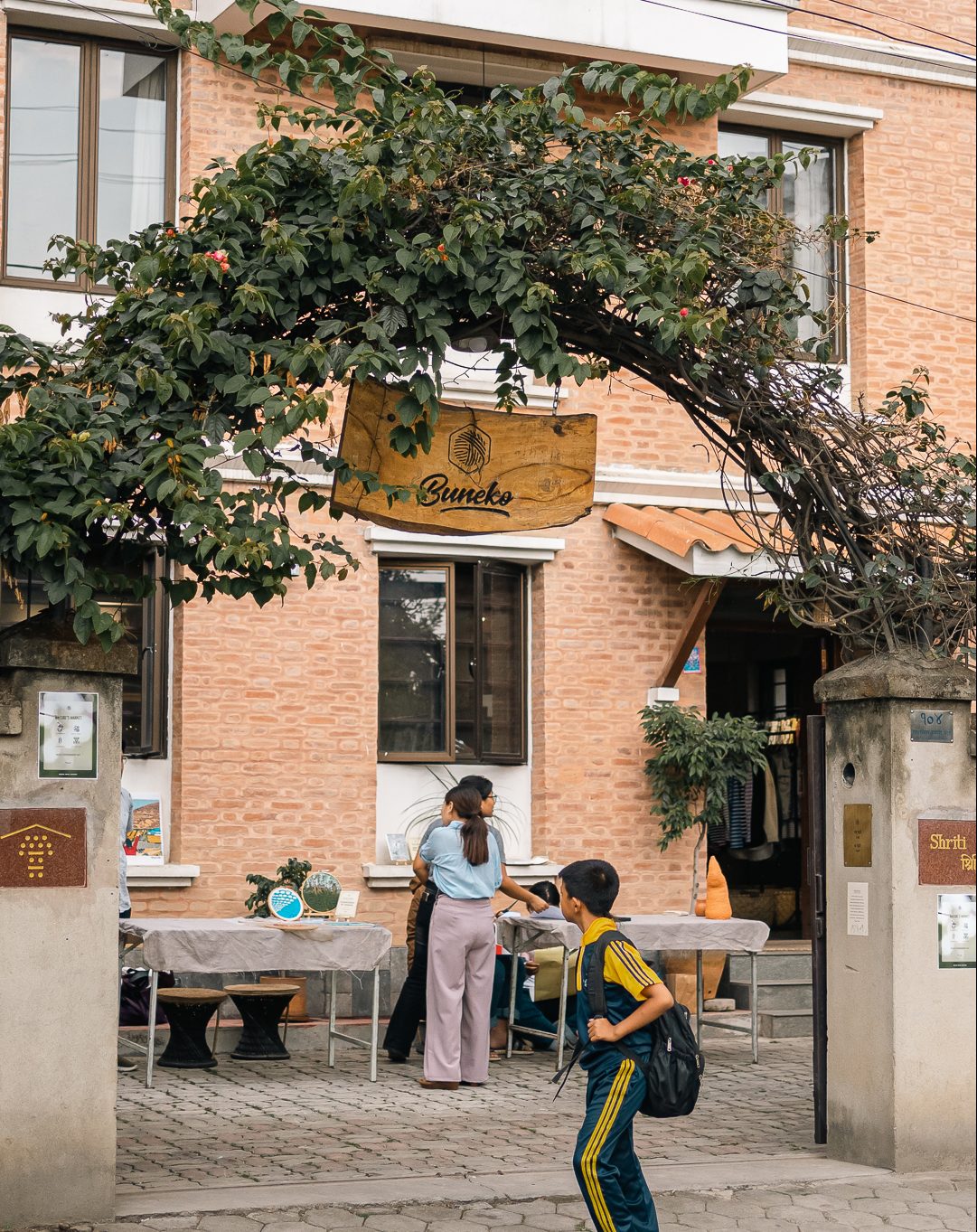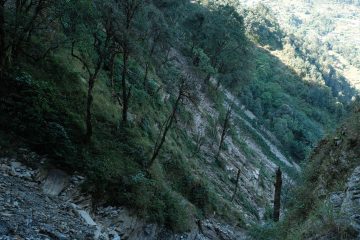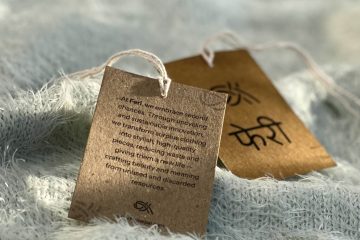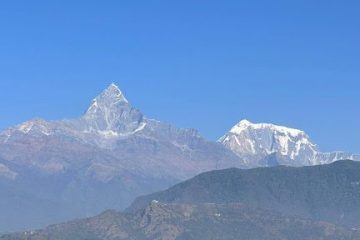On June 5, 2024, World Environment Day was observed in Jhamsikhel, Nepal, through an event titled “Nature’s Market,” organized by Buneko Nepal. This gathering aimed to address the critical question of effective environmental action in the face of global ecological challenges.
As evening approached, sixty individuals identified as change makers convened in Jhamsikhel. The long shadows of early evening stretched across a land ranked fourth in global climate vulnerability, setting a poignant backdrop for the gathering. These individuals brought with them not just products and art, but flickering hopes for a future that often seems uncertain. As daylight faded, their determination seemed to grow stronger, mirroring the warm glow of the setting sun that illuminated their faces and their cause.
The Urgency of Now
Where mountains meet smog: A stark reminder of our environmental crisis. Pic by Amit Machamasi
Nepal’s precarious position in the face of climate change isn’t just a statistic—it’s a lived reality. Nestled in the fragile Himalayan ecosystem, Nepal faces a perfect storm of environmental threats. Rapidly melting glaciers threaten water security for millions, while increasingly erratic monsoons alternate between devastating floods and prolonged droughts. The country’s diverse landscapes, from fertile lowlands to towering peaks, are all at risk, imperiling both biodiversity and the livelihoods of countless Nepalis.
One of the event’s featured artists, poignantly wrote:
“What future do we plan for Without a planet to accomplish them? What legacy do we leave behind As the mountains lose their crowns?”
– Birat Bijay Ojha
These words set the tone for Nature’s Market, reminding us all why we had gathered. It wasn’t just about showcasing eco-friendly products; it was about creating a space where concern could transform into action. With Nepal ranking fourth globally in climate vulnerability, the need for such transformation has never been more urgent. The very foundations of Nepal’s culture, economy, and way of life hang in the balance, making initiatives like Nature’s Market not just important, but essential for the country’s future.
Art as a Mirror and a Window
Art as a Mirror and a Window: Reflecting on Our Shared Environment
Eight artists brought their unique perspectives to the event, each using their craft to reflect our environmental reality and imagine a better future. Amit Machamasi’s photographs captured the raw beauty of Nepal’s landscape and its flora and fauna, while Dia Yonzon’s poetry spoke to the urgency of our situation:
“This summer, I am learning to swim. Not Because I think I can outrun the ocean, but because maybe, just maybe, if it comes for me, I can at least fight back a little.”
– Dia Yonzon
But it was Rohan Shrestha‘s story that brought many to tears. After losing a friend to a landslide, Rohan found a way to keep their memory alive—by scattering their ashes to grow trees. “Now, my friend lives on in diverse beings,” Rohan explained, his voice thick with emotion. “They experience life through different mediums—as trees hosting birds and microorganisms, as soil enriching new growth. Our friendship has evolved into a budding forest.”
Sustainability in Action
Crafting a Sustainable Future: Where Art Meets Eco-Innovation at Nature’s Market
Nature’s Market wasn’t just about contemplation; it was a showcase of practical solutions. Bamboo Bazaar displayed an array of products crafted from this versatile, sustainable material. Wuka Nepal presented their innovative reusable period panties, challenging traditional waste-producing alternatives. Maato Nepal‘s handmade ceramics demonstrated how beauty and sustainability can go hand in hand.
The Haruko Art Collective, a group of art students dedicated to sustainable practices, found kindred spirits at the event. “We’re thrilled to meet fellow artists who share our commitment to reusing materials and promoting eco-friendly art,” shared one collective member. Their enthusiasm was palpable, a reminder that sustainability can be a source of connection and creativity.
Community Commitment
Pledging for a Sustainable Future: Every Promise Counts
A board of resolutions stood at the heart of the market, rapidly filling with promises and commitments from visitors, artists, and brands alike.
One pledge in particular, stood out:
“Use until there’s a hole. Once there’s a hole, reuse it as a modifying fashion.“
– Salil Maharjan
This simple statement encapsulated the event’s ethos—finding beauty and purpose in what others might discard.
The Bigger Picture
The bigger picture: coming together to fight the crisis
Nature’s Market is more than a single event; it’s part of a growing global movement. Similar initiatives are springing up worldwide, from zero-waste markets in Berlin to upcycling festivals in São Paulo. By connecting local action to this global context, we remind ourselves that we’re part of something bigger—a worldwide community working towards a sustainable future.
Looking Forward
Reflecting on the success of Nature’s Market, Saurav Karki, founder of Buneko Nepal, envisions future events and collaborations to make sustainability both accessible and exciting.
As the day drew to a close, the air buzzed with possibility. Saurav Karki, founder of Buneko Nepal and curator of Nature’s Market, reflected on the event’s success: “It was incredible to see so many people come together, not just to talk about sustainability, but to live it. From the recycled paper we used for promotion to the complete absence of single-use plastics, every aspect of this event was designed with our planet in mind.”
But Nature’s Market is just the beginning. Buneko Nepal is already planning future events, workshops, and collaborations to build on this momentum. “We want to make sustainability not just accessible, but exciting,” Saurav explained. “It’s about creating a community where eco-friendly choices are the norm, not the exception. Buneko Nepal is committed to working with indigenous communities to promote eco-friendly, sustainable products.”
A Call to Action
Join us now. Big changes start with small choices.
So, what can you do? Start small. Support local, sustainable businesses. Attend or organize eco-friendly events in your community. Share your own sustainability journey on social media to inspire others. And remember the words of
“What you do makes a difference, and you have to decide what kind of difference you want to make.”
– Dr. Jane Goodall
Nature’s Market showed us that when we come together, change is possible. It’s up to each of us to carry that spirit forward, to turn the flickering hope we saw in Jhamsikhel into a blazing beacon for a sustainable future.
Will you join us?





